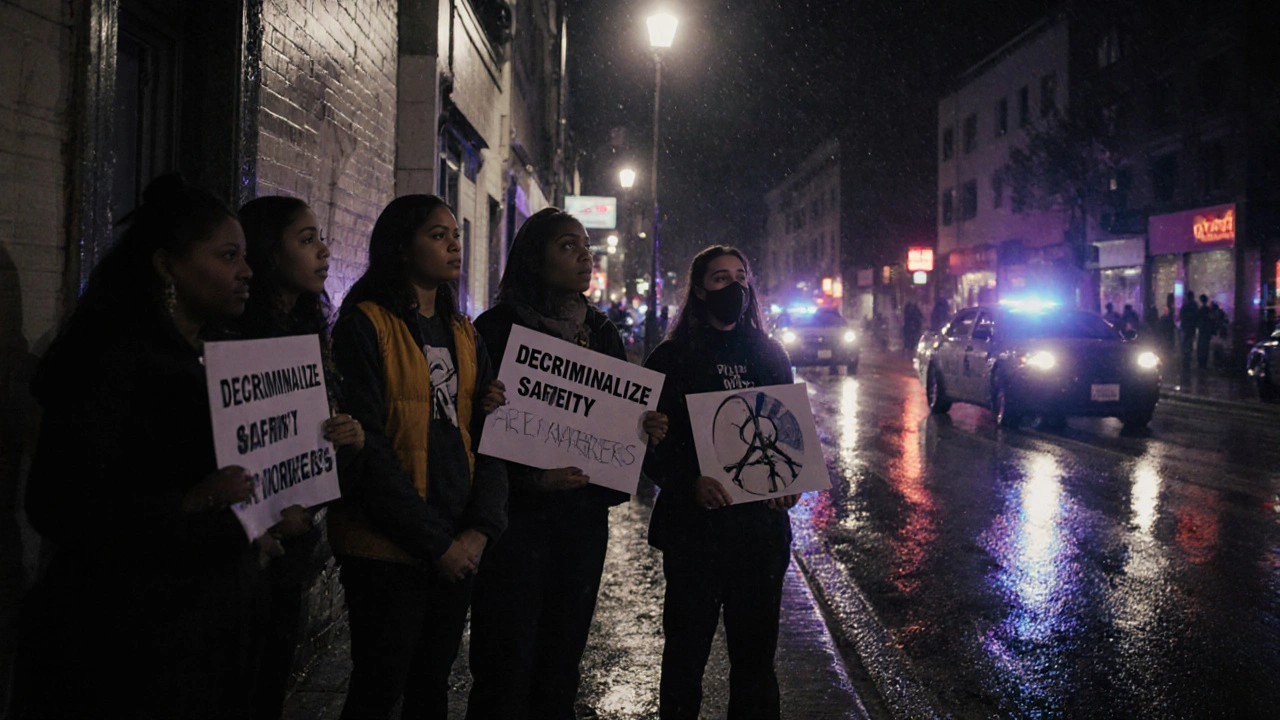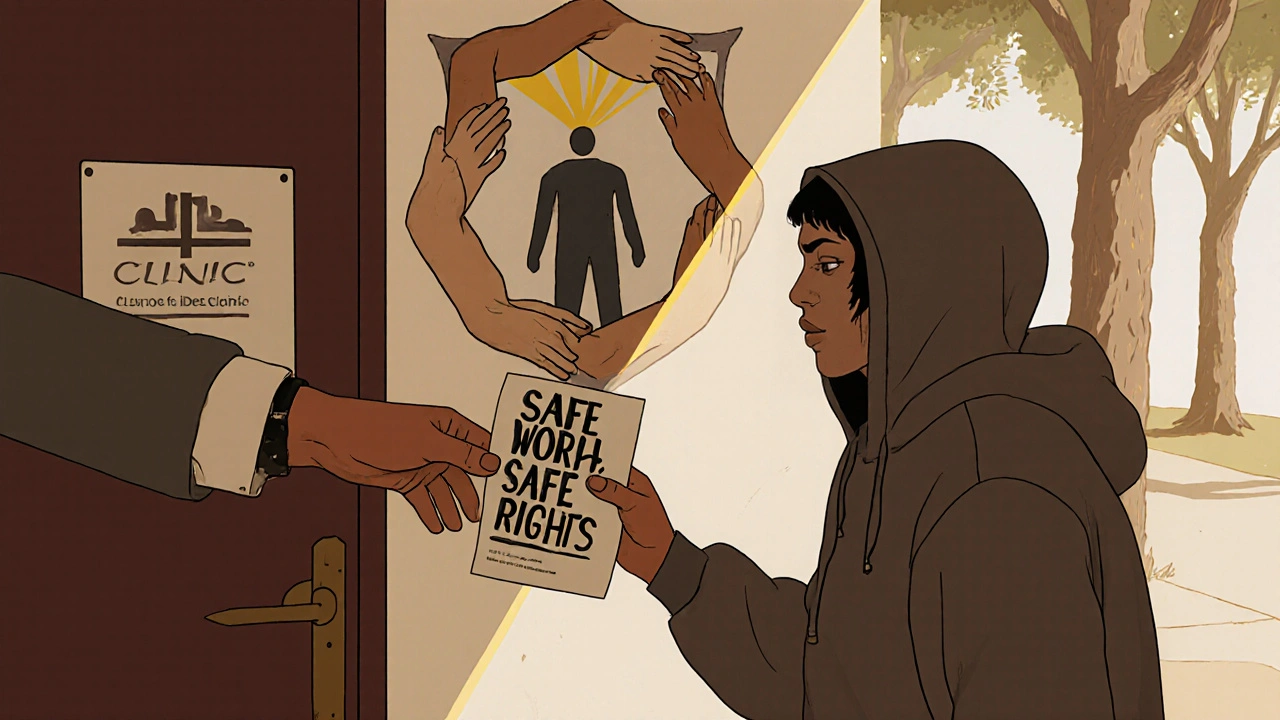You’ve probably heard conflicting things about sex work and the law. Some say it’s illegal. Others claim it’s decriminalized. The truth? It’s messy, inconsistent, and leaves sex workers vulnerable-no matter how hard they try to stay safe. If you’re asking, are sex workers protected by law? the short answer is: not really. Not in the way most people assume.
Key Points
- Sex work itself isn’t illegal in the UK, but nearly everything around it is.
- Working alone indoors is legal; working on the street or with others is risky and often prosecuted.
- Sex workers can’t legally advertise, hire security, or rent spaces without risking arrest.
- Police focus on clients and third parties, not on protecting sex workers from violence or exploitation.
- Organizations like the English Collective of Prostitutes fight for decriminalization, not legalization.
What Does the Law Actually Say?
Let’s cut through the noise. In England and Wales, selling sex isn’t a crime. You won’t get arrested just for exchanging money for sexual services. But that’s where the protection ends. Everything that makes sex work safer-advertising, sharing a workspace, hiring a driver, working with a colleague-is against the law.
Under the Sexual Offences Act 2003, it’s illegal to:
- Control or manage a brothel (even if you’re the only worker)
- Solicit in a public place (street-based work)
- Advertising sexual services online (classified as "kerb crawling" or "pimping" by law enforcement)
- Live off the earnings of someone else’s sex work (this includes partners or managers)
So if you’re a sex worker and you rent a flat to work from, you’re breaking the law-even if you’re alone. If you use Instagram to post your profile? You’re risking charges. If you ask a friend to drive you to a client? They could be charged with "living off immoral earnings."
The law doesn’t protect sex workers. It makes their work dangerous by forcing it underground.
Why This System Doesn’t Work
Think about this: if you were a nurse, you’d have a workplace, training, a union, and legal recourse if someone harmed you. Sex workers? No. The law treats them like criminals, not workers.
When a sex worker is assaulted, they often don’t report it. Why? Because they fear being arrested. Because police have historically treated them as suspects, not victims. A 2023 study by the London School of Economics found that 78% of sex workers in London had experienced violence in the past year-but only 12% contacted the police. The rest feared being criminalized themselves.
And it’s not just violence. Without legal recognition, sex workers can’t access housing support, healthcare, or even bank accounts without being flagged. Many use cash-only systems because banks shut down their accounts if they suspect sex work.
The system isn’t designed to protect people. It’s designed to punish visibility.
How Sex Work Actually Works in the UK
There are three main ways sex workers operate in the UK today:
- Independent online workers-They use private websites or encrypted apps to connect with clients. They screen carefully, work from home or rented rooms, and avoid public spaces. This is the safest model, but still technically illegal if they advertise.
- Street-based workers-Often the most vulnerable. They work in isolated areas, at night, with little control over who approaches them. Police frequently move them on, citing "anti-soliciting" laws. Many are migrants, homeless, or have survived abuse.
- Agency workers-Some work through agencies that claim to be "escorts services" or "companion agencies." But if the agency takes a cut and organizes bookings, it’s legally a brothel-and therefore illegal. Many agencies operate in a gray zone, using loopholes to avoid prosecution-but workers still have no legal rights.
Independent online work is growing. More sex workers are using platforms like OnlyFans or private booking sites. But even here, they’re at risk. Payment processors like PayPal and Stripe routinely freeze accounts linked to sex work. Social media bans their profiles. They’re constantly pushed to the edges of the digital world.

What Protection Do They Actually Have?
Legally? Almost none. But in practice, some protections exist-just not from the law.
Organizations like the English Collective of Prostitutes and UK Network of Sex Work Projects offer emergency housing, legal advice, and peer support. Some clinics provide free STI testing and trauma counseling. These are lifelines-but they’re underfunded and rely on charity.
Police sometimes help if a sex worker reports a violent crime. But only if they’re lucky. Many report being blamed, disbelieved, or even threatened with arrest during investigations. There’s no legal duty for police to protect sex workers. No policy guarantees their safety.
And if you’re undocumented? Your rights shrink even further. Migrant sex workers face deportation threats if they report abuse. No one is looking out for them.
Decriminalization vs. Legalization: What’s the Difference?
You’ll hear both terms thrown around. But they mean totally different things.
Legalization means the government creates rules for sex work-like licensing, mandatory health checks, or zoning laws. That’s how it works in parts of Germany or the Netherlands. But legalization often creates a two-tier system: licensed workers get protection, unlicensed ones get punished. Many sex workers say this just pushes more people into danger.
Decriminalization means removing all criminal penalties for sex work. No laws against selling, buying, advertising, or working together. Sex workers are treated like any other worker-with labor rights, access to courts, and protection from violence. That’s the model supported by the World Health Organization, Amnesty International, and the UN.
Canada and Sweden took a different route: they criminalized clients but not workers. It’s called the "Nordic Model." But studies show it just drives sex work further underground. Workers feel more pressure to rush clients, skip screening, and avoid reporting abuse because they’re afraid of losing income.
In the UK, decriminalization is the goal of most sex worker-led groups. Not legalization. Not criminalization. Just removal of the laws that make their work unsafe.
What Would Real Protection Look Like?
If the law actually protected sex workers, here’s what it would include:
- The right to work safely indoors without fear of prosecution
- The right to screen clients without being accused of "pimping"
- The right to hire security, drivers, or assistants
- The right to advertise their services without being labeled a criminal
- The right to report violence without being arrested
- The right to access housing, banking, and healthcare without discrimination
That’s not radical. That’s basic human rights.
Imagine if your job was making you break the law just to stay safe. That’s the reality for tens of thousands of people in the UK right now.

How You Can Help
You don’t have to be a sex worker to care about this. If you believe in safety, dignity, and justice, you can support change.
- Donate to sex worker-led organizations like English Collective of Prostitutes or St. Mungo’s.
- Amplify their voices on social media. Don’t speak over them-share their statements.
- Call your MP. Ask them to support decriminalization of sex work.
- Challenge myths. Sex work isn’t trafficking. Not all sex workers are victims. Many choose this work because it pays well, offers flexibility, or fits their life.
Change won’t happen overnight. But it starts with recognizing that sex workers are people-and people deserve protection under the law.
Frequently Asked Questions
Is it legal to be a sex worker in the UK?
Yes, selling sex is not illegal in England, Wales, or Scotland. But almost every activity that supports safe sex work-like advertising, sharing a workspace, or hiring help-is against the law. This creates a dangerous contradiction: you can do the job, but not do it safely.
Can sex workers report crimes to the police?
They can, but many don’t. A 2023 survey found that 78% of sex workers in London experienced violence in the past year, but only 12% reported it to police. Fear of arrest, disbelief, or being treated as a criminal stops most from seeking help. Even when police respond, they often focus on the worker’s legality-not the perpetrator’s crime.
Why can’t sex workers use banks or social media?
Financial institutions and tech companies classify sex work as "high risk" or "prohibited content." PayPal, Stripe, Instagram, and Facebook routinely freeze accounts or ban profiles linked to sex work-even if the content is legal. This forces workers into cash-only systems, making them vulnerable to theft and exploitation.
What’s the difference between decriminalization and legalization?
Legalization means the government sets rules for sex work-like licenses, health checks, or zones. Decriminalization removes all criminal penalties. Sex workers aren’t regulated by the state; they’re treated like any other worker. Decriminalization is the model supported by global health and human rights organizations because it reduces harm and increases safety.
Are most sex workers exploited or trafficked?
No. Research from the University of Oxford and the London School of Economics shows that the vast majority of sex workers in the UK are not trafficked. Many choose this work for its flexibility, income, or autonomy. While trafficking does exist, conflating all sex work with trafficking harms real victims and ignores the agency of workers who want safety-not punishment.
What’s the biggest threat to sex workers today?
The law. Criminalization forces sex work underground, making it harder to screen clients, get help after violence, or access services. When you’re breaking the law just to work safely, you’re always one step away from disaster. Real protection comes from removing these laws-not adding more.
Final Thought
Are sex workers protected by law? Not by the ones we have. But they don’t need more laws-they need fewer. They need the same rights you have: to work without fear, to speak up without punishment, to be seen as human. That’s not asking too much.



6 Comments
Devin Tankersley
This is pure socialist propaganda wrapped in victimhood. Sex work is a symptom of societal decay, not a legitimate profession. You want protection? Get a real job. The law exists to uphold morality, not enable degeneracy. Stop romanticizing prostitution-it’s exploitation dressed up as empowerment. And don’t give me that 'human rights' crap. If you’re selling your body, you’re not a worker, you’re a commodity. End of story.
Mathew Thomas
What if safety wasn’t a privilege, but a right? What if we stopped punishing people for surviving? The law doesn’t protect the vulnerable-it protects the comfortable. And the comfortable? They’re the ones writing the rules. Decriminalization isn’t radical. It’s just… human.
Jennifer bomabebe
Dear esteemed colleagues, I am writing from Nigeria, where the cultural context is vastly different, yet the underlying principles of dignity and justice remain universal; sex work, regardless of legal status, is often a last resort for women who have been abandoned by education, employment, and family structures; to criminalize their survival is not justice-it is institutionalized cruelty; we must remember that every human being deserves the right to live without fear, without stigma, and without the constant threat of arrest for simply trying to feed their children.
Kristen O.
Let’s unpack this with some structural analysis: the current regulatory framework operates under a carceral logic that pathologizes agency. The Nordic Model? A performative allyship trap-it criminalizes demand while leaving supply in the shadows, increasing vulnerability. Meanwhile, fintech platforms engage in de facto redlining under the guise of ‘risk compliance.’ It’s not about morality-it’s about capital control. 💸 #DecrimNow #SexWorkIsWork
Heather Conover
It’s amusing how people mistake decriminalization for legitimacy. You can’t rebrand an immoral activity as a profession by changing the law. If this were a real job, you’d need a business license, tax ID, insurance. But no-people want the income without the accountability. The law is clear: you can’t have your cake and eat it too. This isn’t discrimination-it’s common sense. And if you think banks are being unfair, maybe you shouldn’t be doing something society has deemed unacceptable for centuries
Lisa Sanders
This is why America is falling apart. We’re rewarding crime instead of punishing it. If you’re doing something illegal, you don’t get a medal-you get handcuffs. End of discussion.